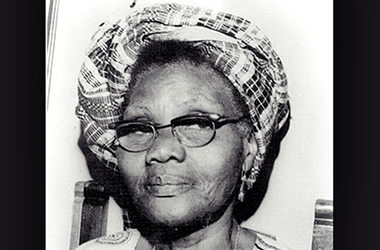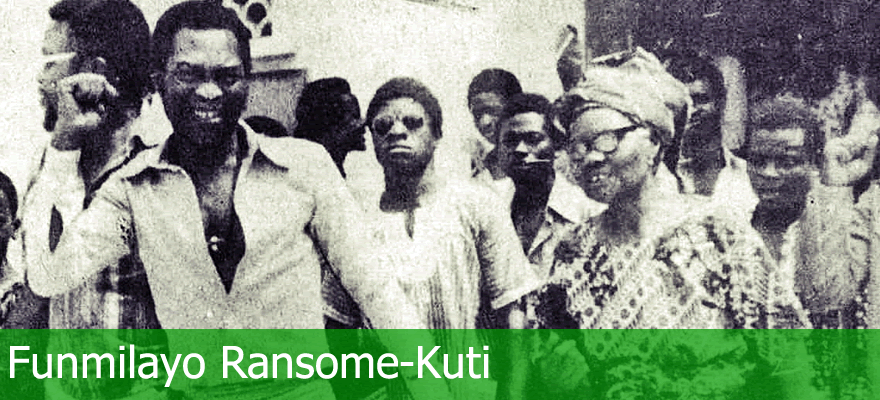Funmilayo Ransome-Kuti (born Frances Abigail Olufunmilayo Thomas) was a teacher, political campaigner, women's rights activist, traditional aristocrat and founder of the Nigerian Women’s Union. She was one of the most prominent leaders of her generation and was the mother of Afrobeat musician and political activist Fela Kuti.
Early Life and Family
Ransome-Kuti was born on October 25, 1900 in Abeokuta, Ogun State. Her father, Daniel Olumeyuwa Thomas, was the son of a returned slave from Sierra Leone who traced his ancestral history back to Abeokuta. He became a member of the Anglican Faith and soon returned to the homeland of his fellow Egbas.
Ransome-Kuti attended St John’s Primary School, Igbe in Abeokuta from 1906 to 1913. In 1914, she became a student at the Abeokuta Girls' Grammar School, a Christian missionary school founded in 1908. She took her Preceptor’s Examination at the Grammar School and taught there until May 1919 when she was sponsored by the Church Missionary Society and her father’s cousin, a UAC agent, to study in England.
Ransome-Kuti enrolled at Wincham Hall College where she studied domestic sciences, education, French and music. She decided to drop the names Frances and Abigail and to be known only by her shortened third name, Funmilayo. Upon receiving her teaching credentials, she returned to Nigeria in 1922 and taught at the Abeokuta Girls' Grammar School from 1923 to 1924. There, she met Reverend Israel Oludotun Ransome-Kuti, an Anglican minister who was the school’s principal at the time. The two married on January 20, 1925 and had four children: three sons - Fela, Beko and Olikoye - and one daughter, Dolu. Reverend Ransome-Kuti became the first president of the Nigeria Union of Teachers (NUT) from 1931 to 1954; the NUT was the first multi-ethnic and nationalist association in the country. He was also a human rights activist and both husband and wife worked to end colonialism in Nigeria.
In the 1970s, decades after the death of her husband, she (along with her youngest son Fela) changed her last name to Anikulapo-Kuti; Anikulapo is a Yoruba word that roughly translates to “warrior who carries powerful protection” or “he who carries death in his pouch.”
Activism
Ransome-Kuti was known throughout her career as an educator and activist. She organised literacy classes for women in the 1920s and founded a nursery school in the 1930s. In 1942, she founded the Abeokuta Ladies' Club (ALC) for educated women involved in charitable work. She also started the Social Welfare for Market Women club to help educate working-class women (the first adult education program for women in Nigeria). Along with Eniola Soyinka (her sister-in-law and the mother of Nobel Laureate Wole Soyinka), she merged the ALC and the market women’s club to form the Egba or Abeokuta Women's Union, which had a membership of over 20,000 individuals. The core objective of the organisation was fighting against the arbitrary exercise of colonial power by the British-supported puppet king of Egbaland, the imposition of taxes on women without granting them the right to vote and the attempt by the British to control markets run by women (trading was one of the major occupations of women in Western Nigeria of the time). Through this project, she also supported Nigeria’s independence movement.
In 1949, she led a protest against the native authorities, in particular the Alake of Egbaland, Oba Ademola II. She presented documents alleging abuse of authority by the Alake who had been granted the right to collect the taxes by the British colonial government. Through a series of marches involving tens of thousands of women, a refusal to pay taxes, strikes and a wide spectrum of measures of civilian disobedience, the Abeokuta Women's Union forced the Alake to abdicate his throne and won women representation in the Sole Native Authority (a committee that was granted some say in the colonial administration). This eventually drove the administration of the Egba kingdom, which was under the authority of Great Britain, to the brink of collapse. These protests (which caused a sensation across the nation and internationally) are often referred to historically as the 'Egba Women's War' or the 'Nigerian Women's Struggle'.
Ransome-Kuti’s political activism led to her being called the doyen of female rights in Nigeria as well as 'The Mother of Africa'. She also oversaw the successful abolition of separate tax rates for women.
In 1953, the Egba Women’s Union became the Federation of Nigerian Women Societies, which subsequently formed an alliance with the Women's International Democratic Federation (of which Ransome-Kuti was made World Vice-President in the same year).
Politics
In 1947, the Nigerian Union of Students (led by Ransome-Kuti’s husband) became the National Council of Nigeria and the Cameroons (NCNC), the party of the first Nigerian president Nnamdi Azikiwe. She became a key member of the NCNC as a result of her close association with its roots and led the women’s wing of the party. Azikiwe selected her as the representative of the women of Nigeria as well as of the Western Region for the NCNC delegation that travelled to London in 1947. She was elected treasurer of the Egba division of the party in 1956.
However, Ransome-Kuti was often in conflict with Azikiwe and the rest of the party leadership because she felt women were not as well-represented as men. She was eventually expelled from the party when she failed to win a federal parliamentary seat in the 1959 elections.
However, her political activism never truly ended. Prior to independence, she founded the Commoners Peoples Party (CPP) in an attempt to challenge the ruling NCNC, ultimately denying them victory in her area: her party earned 4,665 votes to NCNC's 9,755, thus allowing the opposition Action Group (which had 10,443 votes) to win. She was one of the delegates that negotiated Nigeria's independence with the British government.
In the 1950s, she was one of the few women elected to the house of chiefs, becoming an Oloye of the Yoruba people. At the time, the house of chiefs was one of her homeland's most influential bodies.
Travel Ban
During the Cold War, Ransome-Kuti travelled widely owing to her status as the world vice-president of the Women’s International Democratic Federation, angering the Nigerian as well as British and American governments by establishing contacts within the Eastern Bloc during visits to the USSR, Hungary and China (where she met Mao Zedong, the founding father of the People's Republic of China). In 1956, her passport was not renewed as it was feared that she could influence other women with her allegedly communist ideas and policies. She was also refused a US visa by the American government on the same grounds.
Achievements
Ransome-Kuti was the first Nigerian women to drive a car and ride a motorcycle. She was Nigeria's first ever representative at a women's international conference (in the USSR in 1963). She was one of the founders of the Nigeria Union of Teachers and the Nigerian Students Union. The University of Ibadan awarded her an honorary doctorate in law in 1968 and in 1970 she was declared the winner of the Lenin Peace Prize.
Death
In old age, her activism was overshadowed by that of her three sons who provided effective opposition to various military regimes. In 1978, Ransome-Kuti was thrown from a second-floor window when her son Fela’s compound (a commune known as the Kalakuta Republic) was stormed by a thousand armed military personnel. She lapsed into a coma in February of that year and died on April 13 in Lagos as a result of injuries sustained during the assault. She was buried in Abeokuta on May 5, 1978.
Sources
- Nigerian Women: A Historical Perspective edited by Bolanle Awe (2001)
- Ake: The Years of Childhood by Wole Soyinka (1981)
- Answers.com
- Wikipedia
- The Green R' Nigeria
- Facts on File
Picture sources: Geocities - Remembering Fela and Naijarchives®


